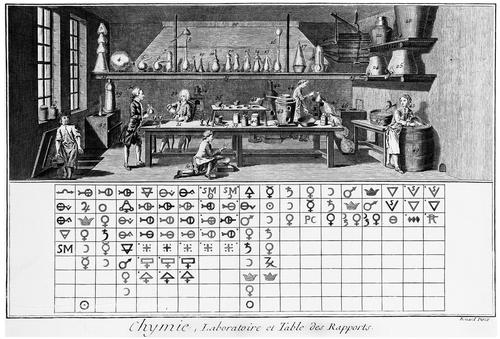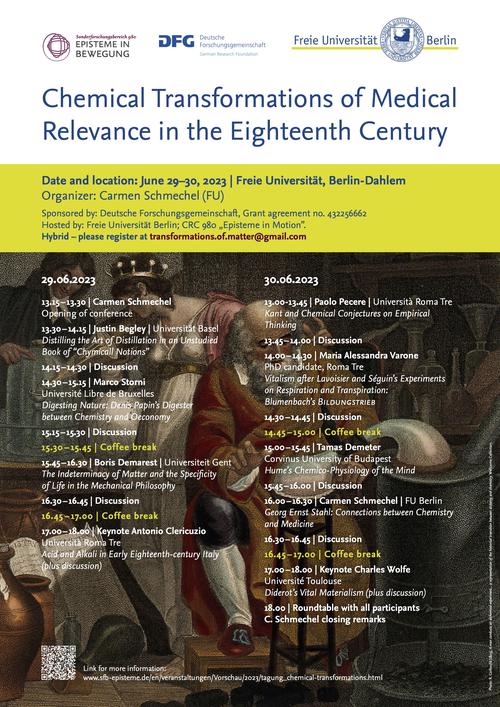Chemical laboratory, Paris. 1760.
Bildquelle: Wellcome Collection. Attribution 4.0 International (CC BY 4.0).
Poster Chemical Transformations
(Medicine, Life, and Transformations of Matter Part II)
A conference organized by the associated project “Fermentation: A Cultural History of Knowledge” by Dr. Carmen Schmechel
Abstract
As mechanist approaches grew in significance in the seventeenth century, the ancient Greek ‘souls’ were slowly driven out of physiology. In the eighteenth century, this development was almost definitive, with Georg Ernst Stahl holding a rather isolated position defending a biomedical soul (anima physico-medica).
At the same time, the new organic-anorganic divide was taking shape, crucially favoring the emergence of modern biology and biochemistry. These developments enabled new views on material transformations happening both in nature and in the body. Theories on metabolism were on the rise, including in more metaphorical and speculative senses, while scientists such as Lavoisier continued to be preoccupied with the micro-level descriptions and explanations of chemical change in matter. Medicine, on the other hand, tended to focus on more practical aspects due to its different goals. For medicine, of great importance was what effect substances and their metabolization have on the body, and how it influences disease: positively, negatively, causatively or accidentally. Nevertheless, chemistry’s relationship with medicine in the eighteenth century was less one of conflict and more one of mutual enhancement, with many practitioners active in both realms, such as Boerhaave or Stahl.
Situated at this nexus, this conference aims at mapping those chemical transformations which were of relevance in eighteenth-century medicine. How was respiration understood, in the light of new chemical discoveries by Lavoisier? What role did combustion play in physiology, and how did it differ from older ideas about fire, popular in the century before? How did these new understandings impact the thinking about the human body, as well as about broader issues such as the organic-anorganic divide?
Participation via Webex is possible: https://fu-berlin.webex.com/meet/fu7777mf
For more information please write to: transformations.of.matter@gmail.com
Programme
29.06.2023
13.15-13.30 Carmen Schmechel – Opening of conference
13.30-14.15 Justin Begley (Universität Basel) – Distilling the Art of Distillation in an Unstudied Book of “Chymicall Notions”
14.15-14.30 Discussion
14.30-15.15 Marco Storni (Université Libre de Bruxelles) – Digesting Nature: Denis Papin's Digester between Chemistry and Oeconomy
15.15-15.30 Discussion
15.30-15.45 Coffee break
15.45-16.30 Boris Demarest (Universität Ghent) – The Indeterminacy of Matter and the Specificity of Life in the Mechanical Philosophy
16.30-16.45 Discussion
16.45-17.00 Coffee break
17.00-18.00 Keynote Antonio Clericuzio (Università Roma Tre) – Acid and Alkali in Early Eighteenth-century Italy (plus discussion)
30.06.2023
13.00-13.45 Paolo Pecere (Università Roma Tre) – Kant and Chemical Conjectures on Empirical Thinking
13.45-14.00 Discussion
14.00-14.30 Maria Alessandra Varone (PhD candidate, Roma Tre) – Vitalism after Lavoisier and Séguin’s Experiments on Respiration and Transpiration: Blumenbach’s Bildungstrieb
14.30-14.45 Discussion
14.45-15.00 Coffee break
15.00-15.45 Tamas Demeter (Corvinus University of Budapest) – Hume’s Chemico-Physiology of the Mind
15.45-16.00 Discussion
16.00-16.30 Carmen Schmechel (FU Berlin) – Georg Ernst Stahl: Connections between Chemistry and Medicine
16.30-16.45 Discussion
16.45-17.00 Coffee break
17.00-18.00 Keynote Charles Wolfe (Université Toulouse) – Diderot’s Vital Materialism (plus discussion)
18.00 Roundtable with all participants, C. Schmechel closing remark
Zeit & Ort
29.06.2023 - 30.06.2023
Freie Universität Berlin
SFB 980 Episteme in Bewegung
Sitzungsraum
Schwendenerstraße 8
14195 Berlin
Weitere Informationen
Creator and organizer: Carmen Schmechel (FU)
Sponsored by: Deutsche Forschungsgemeinschaft, Grant no. 432256662
Hosted by: Freie Universität Berlin; CRC 980 „Episteme in Motion”

